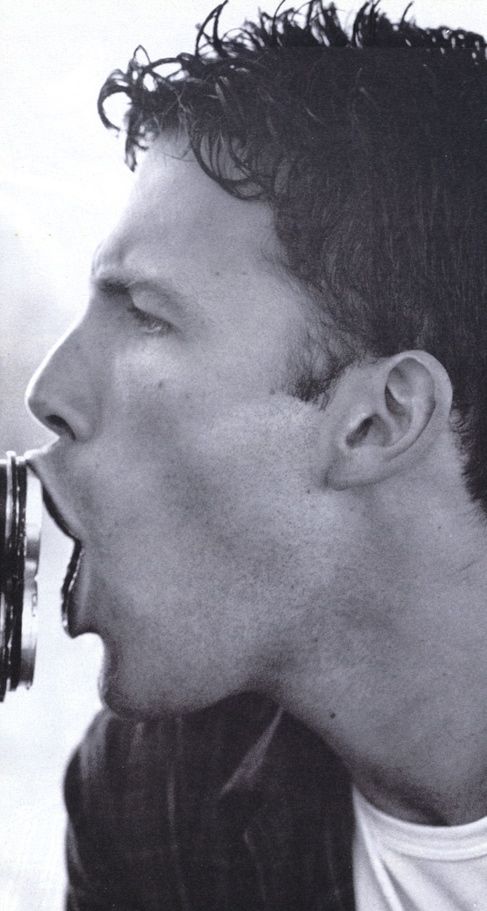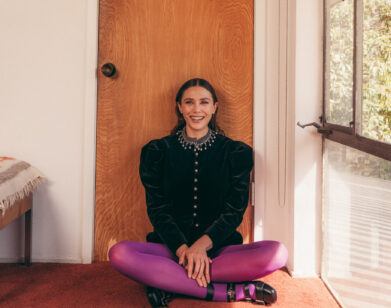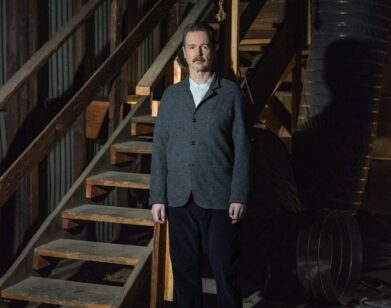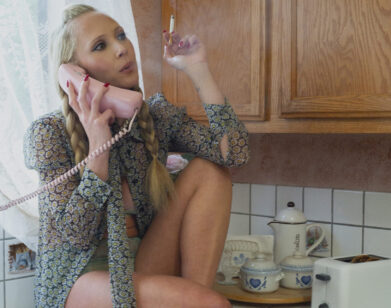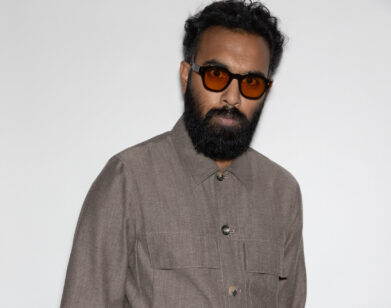New Again: Ben Affleck
A lot has been said about the bromance between Matt Damon and Ben Affleck. The tabloid world has tried and failed to manufacture a feud between them. Their careers have, at times, sped ahead of one another’s and then caught back up. They’ve each enjoyed enduring success as actors, directors (well, Affleck has), and producers, but haven’t developed a project together since Good Will Hunting, which, incidentally, is the last time we interviewed the pair together.
Featured in our December 1997 issue just before the release of Good Will Hunting, Damon and Affleck spoke extensively about growing up in Cambridge, their feelings about actors and narcissism, and the success story of writing a film in which they could both star.
Over a decade and a half later, Affleck has three, huge adaptations slated. He’ll be playing Batman in Warner Bros. new reboot alongside Henry Cavill’s Superman, sometime next year. He’s working on a film about Boston mobster Whitey Bulger with Damon, the first collaboration between the two in years. But most of all, he’s playing Nick Dunne in David Fincher’s adaptation of the bestseller Gone Girl.
The unconventional trailer for Gone Girl was just released—a surprisingly long teaser, at one minute and 39 seconds—and its somber colors are in keeping with Fincher’s signature dark palette. Affleck plays the husband of a missing woman (played by Rosamund Pike). In anticipation of the film, out in October, we decided to explore Affleck’s history. —Kenzi Abou-Sade
Matt Damon and Ben Affleck
By Ingrid Sischy
With flagrant disregard for the way things get done in the movie business, lifelong friends and fellow actors Matt Damon and Ben Affleck decided to write a movie they could act in. Now that movie—Good Will Hunting, directed by Gus Van Sant and costarring Robin Williams and Ben’s kid brother, Casey—is about to hit the theaters and, lo and behold, it’s an experience not to be missed.
The film is about the dilemmas of choice and responsibility, and the burdens of belonging. It’s the story of a damaged young working-class Bostonian (played by Damon) who works as a janitor at MIT and is discovered solving math problems that defeat even the most gifted students. As he is plunged into the competitive world of academia, he has to decide whether to follow his heart—which his best friend (Ben Affleck) urges him to do—or the self-destructive impulses that are the legacy of his upbringing.
These boys haven’t arrived out of the blue. Damon, who first grabbed audiences’ attention in Geronimo (1993) and then gave a fine performance in last year’s Courage Under Fire, plays the embattled lawyer in Francis Ford Coppola’s recently released The Rainmaker. Emerging from jock roles in films like Dazed and Confused (1993), Ben Affleck was outstanding this year in both Chasing Amy and Going All the Way. With Good Will Hunting, they’re finally going solo together.
INGRID SISCHY: I want to start at the beginning of your friendship. Did you both grow up in the same neighborhood?
BEN AFFLECK: Yes. Two blocks away from each other in Cambridge, Massachusetts.
MATT DAMON: Cambridge is not that big of a town. It’s like the People’s Republic of Cambridge.
AFFLECK: And people of similar political persuasions tend to flock together. Most lefties in “Cambridge County” know each other.
DAMON: And we were basically best friends since I was 10 and he was eight.
SISCHY: How did you meet?
DAMON: My mother is a professor of early childhood development, and she knew Ben’s mother—who’s a teacher of little kids—and sought her out after we moved back to Cambridge. So I was pretty much forced into hanging out with Ben.
AFFLECK: And Matt was a break-dancer at the time.
SISCHY: Can you remember, Matt, what Ben was like in those days?
DAMON: Absolutely. I remember exactly what he was like: gregarious, outgoing. It was no surprise that he grew up into the totally obnoxious guy he is now. Number one, he claims that I never struck him out in Little League. Which is total bullshit—I was the best pitcher in the league.
AFFLECK: That achievement in Little League grows exponentially with each passing year.
SISCHY: I see.
AFFLECK: We’re the warrior and the clown.
SISCHY: And how does that relate to your childhoods?
DAMON: Our childhoods were pretty normal.
SISCHY: But also informed by the worldview of your parents, I assume.
DAMON: Yes. My mother had written some books on war-play and those cartoons that are like commercials for action figures. What worried my mother about those shows was not only that they encouraged violent play, but also that they hampered creativity. So growing up for me was like you’d get some blocks and then you’d have to go make up a game. I was always making up stories and acting out plays; that’s just the way I was raised. Ben came from a more prestigious acting background.
AFFLECK: My dad was in a theater company in Boston for a long time, so I was always around that stuff.
SISCHY: Did you do theater in high school?
DAMON: A lot. I knew since I was 12 that I was going to be an actor. I was originally going to be a baseball player. Tiny Archibald was my favorite player—he’s called Tiny because he’s only six foot one. My father sat me down and said, “I’m the tallest Damon ever to evolve and I’m five eleven. But I’m never going to play in the NBA.” I gave up basketball at that moment and took up acting.
Whatever I did, I wanted to be the best at it. I remember that moment in The Natural when Robert Redford says, “I just want to walk down the street and have people say, ‘There goes Roy Hobbs, the best there ever was.'” So I was talking to my mother one day—this was when I was 16 or 17—and she goes, “Matt, why are you so obsessed with acting?” And I said, “Because someday I want to walk down the street and have people say, ‘There goes Matt Damon, the best there ever was.'” And she said, “Did I raise you? That’s just an egomaniacal pipe dream. How does it help other people?” Of course I hadn’t given much thought to that.
AFFLECK: In fact, in high school I can remember trying to convince Matt’s mother that not everybody in Hollywood was a total liar and scum. I was saying that there are people in Hollywood who have a social conscience, too. I only repeat this years later now that I realize it was a complete lie. [laughs]
SISCHY: Do you think that wanting to become actors in an academic town like Boston was a kind of rebellion for both of you?
DAMON: We weren’t too rebellious. But every time we sat down to dinner, Chris [Ben’s mother] would say, “Why don’t you guys become doctors?”
AFFLECK: I think our parents were concerned because everybody knows that acting is a difficult career. I don’t think they were that happy with the prospect of their kids facing a lifetime of rejection and scraping by for a sandwich and hoping we’d get free refills at the age of 45. But Matt and I were very straightforward about wanting to be actors. I really think that everybody would like to be an actor. Why wouldn’t they? It’s great work if you can get it. The one thing that prevents most people from saying, “I’m just gonna go to Hollywood!” is that it seems unrealistic.
SISCHY: So by high school you were on your way, in your minds at least?
DAMON: We used to have what we called “business lunches” in high school, which meant we met at the smaller cafeteria and got a table—
AFFLECK: —and worked out some business plans. We were really nerdy. So right now we’d like to skip ahead to these slightly cooler years. Otherwise this is going to get progressively embarrassing.
SISCHY: Well, here comes more embarrassment. Do you think there’s a narcissism quotient in wanting to be an actor?
AFFLECK: I’d say it’s the one quality that unites everybody in the film industry, whether you’re an actor, a producer, a director, or a studio executive. You want people to look at you and love you and go, “Oh, you’re wonderful.” It’s a nightmare. Narcissism is the part of my personality that I am the least proud of, and I certainly don’t like to see it highlighted in everybody else I meet.
DAMON: [laughs] But you know, long ago Ben and I convinced ourselves that didn’t mean us, too.
AFFLECK: It’s like all things in life: You have these qualities in you that are awful, and the best you can do is to try to be aware of them and actively try to diminish them.
SISCHY: At this point in your careers, you can presumably see both sides: You can see the ordinariness of who you’ve been, and you can see ahead of you, and fame looming on the horizon, right? Does the fame part seem attractive or horrifying?
AFFLECK: Making movies has become such a golden ring, and it’s all such a big business, that the rewards system has gotten totally out of whack. Suddenly, you’re treated in a manner befitting someone who is actually an important person. You get the best table, you get all this money, you get people saying, “No, no, I’ll pay the check.” It implies there’s a way of treating certain people as if they’re better than other people, and I don’t think you should do that. It’s difficult for me to see the benefits of fame, except that you get the chance to do the stuff you want to do. Aside from that, the only other good thing I can imagine from being famous is that when I introduce myself, I no longer have to go, “A-f-f…” “A-s-s…?” “No, A-f-f, like Frank.” I get so much mail addressed to Mr. Asslick. That really drives me insane.
SISCHY: [laughs] But don’t you think fame can be not only pleasurable but useful if you want to have some authority in the world and you want people to listen to what you have to say?
AFFLECK: I don’t think actors should have any authority in the world. It’s a scary world when actors have authority. That was the problem with Reagan.
DAMON: Yes, exactly. [laughs] Because somebody is on a television show or in a movie, does that qualify them to talk about an important issue? I have no problem with people who walk it like they talk it, but very few people do. It’s easy when everybody’s paying attention to you to say, “Well, here’s a cause.” But very few actors are moving out of their houses and getting out of their Range Rovers to pick up their fellow man. Those few who do are the real thing, and they usually don’t talk about it.
AFFLECK: Spare us the idiocy and let people who are qualified talk. Instead of listening to what Mariah Carey has to say about world peace, let’s hear from someone who at least has some experience in the matter.
DAMON: Look, I totally believe you should do things to better the world, but oftentimes there’s so much bullshit that just rings so hollow it kinda mucks up the waters. But then there’s a well-known actor I know who has a life goal to change the laws so that tax credits will be given to big corporations for investing in orphanages. He’s got a whole system worked out, but it’s not about him. I think that some actors are more interested in having people think they want to help people than in actually helping them.
AFFLECK: Or in assuaging some sense of guilt because they know they’re overpaid.
SISCHY: I think that often the first thing that happens when someone is a success is they start to feel like a fake, so they need to show how true they are.
AFFLECK: The imposter syndrome. I wonder if there’s anybody who doesn’t feel that way at some time.
SISCHY: Matt, you went to Harvard, right? Did the idea of going there and wanting to be an actor contradict what that place is supposed to be about?
DAMON: Not at all. They saw that I was dedicated to something and that I tried hard at it. The opening line in the essay for my application to Harvard was, “For as long as I can remember, I’ve wanted to be an actor.”
SISCHY: What was your college experience, Ben?
AFFLECK: It was much more choppy.
DAMON: There are few colleges that Ben hasn’t gone to.
AFFLECK: Then I decided that 20 grand a year could be better spent on things like liquor and women. And so that’s the way I went.
DAMON: Ben’s too modest to tell you this, but he’s the most well-read person I know. He’s certainly a lot smarter than I am.
AFFLECK: That’s why we stayed friends: because we lie for each other in crucial moments. It gets you through a development meeting, I can tell you that.
DAMON: “I didn’t want to say anything with Ben in the room, but yes, he did kill somebody, and he feels really strongly that the scene has to stay where it is.”
SISCHY: When you each went your different ways after high school, did you feel in your heart of hearts and in your gut of guts that you would remain friends and end up writing something together—as you eventually did with Good Will Hunting, the movie that opens in late December, that’s got both of you in it, and that’s directed by Gus Van Sant?
AFFLECK: Matt and I had identical interests, so whether we ended up successful or making hot dogs at Dodgers games, we knew we’d end up doing the same sort of thing. The remaining friends part was pretty consistent. We saw each other all the time, we talked on the phone all the time.
SISCHY: Was there ever a period where you lost it with each other?
AFFLECK: Like got mad at each other?
DAMON: [laughs] He cheated on me in ’87. That was a very dark time. But to answer your question: No, we don’t really fight.
AFFLECK: We just pout.
DAMON: Well, you do throw these screeching hissy fits.
AFFLECK: Actually, I’m always self-conscious about Matt and I being boring.
DAMON: We’re constantly accused by people who come in and out of our circle of friends that we’re the most boring people ever. There are people who go, “I got tickets to see so-and-so, and why don’t you guys come?” We’re like, “Yeah, whatever,” and end up at the same bar every night with the same people telling the same old jokes. We’ve always been that way.
SISCHY: And when you’ve had relationships, have you always respected who each other’s chosen?
AFFLECK: There’s respect, but I think you have a false relationship if you pretend all the time that everything’s fine. I think you can only have a healthy friendship with somebody if you’re willing to say, “Listen, man, you’re not fucking picking up after yourself,” or “The person you’re dating is obnoxious.” I think that happens and you kind of accept it.
DAMON: Ben and I’ve lived together in probably 10 different apartments with 10 other people who we grew up with at different times, and the arguments are always the same. For example, I’m a slob and I get yelled at for not cleaning up when the house is a mess. When Ben brings the hookers over, it’s—
SISCHY: Are you roommates now?
DAMON: We were up until a few months ago. We had a place in New York, but we didn’t live there because we were both off doing movies. Now Ben’s living with his girlfriend in L.A. and I just finished working on a film, so I’m going to stay with a friend of mine, Cole Hauser, who’s one of the actors in Good Will Hunting.
SISCHY: Was Ben always the one with all the girls calling?
AFFLECK: That was Matt, really. I was a total failure with girls; it was a catastrophe. It was the girls from the United Way that called me. [laughs] The real story is that I have a problem with the telephone and I don’t return phone calls if I can’t deal with something. It’s not because I’m cool—it’s because I’m a loser and I’m afraid of dealing with something that’s awkward and uncomfortable.
DAMON: Which made one of our roommates mad. He would say, “Would you just call her back? That’s all you have to do.” And Ben would say, “Yeah, I know. I will, I will.” And then the phone would ring again and he wouldn’t take the call.
AFFLECK: Matt’s just better at being diplomatic about these things.
DAMON: The warrior-and-the-clown thing again.
SISCHY: All right, so let’s move on from the romance to work. How did Good Will Hunting come about?
AFFLECK: While Matt was still at Harvard, I went back to visit him and he was working on a story.
DAMON: I was doing a playwriting class and a theater directing class with David Wheeler, who knew this world that Ben and I both come from. And when Ben came back from L.A. for Christmas, I showed him this thing I’d written and—because he knows David, too—he came into the class and we acted it out. It was a scene from what later became Good Will Hunting. Then, when spring break came around the following March, I went to L.A. to audition for a art in Geronimo, which I ended up getting. By then I had this 40-page thing and didn’t know what to do with it. I gave it to Ben, and he looked at it and said, “This is really good. We should write this together.” And I said, “I know, but I don’t know where it should go,” and he said, “I don’t either,” but we agreed to write it. After about a year, Ben and I started talking one night, and the script began flowing right out. Then we wrote it very fast.
SISCHY: Did you each take different parts of it and write them and then show each other?
AFFLECK: We did some of that when we were apart.
DAMON: Once we started, we really got into a groove. While I was away, I’d write and fax the stuff to Ben, and Ben would fax stuff to me, and we’d write on and edit each other’s faxes. It was basically the same as sitting in a room saying, “No, no. I think you should say that.”
SISCHY: What’s the movie about?
DAMON: First of all, let me preface this by saying we are the worst people in the world at doing pitches. We could make a really good movie sound terrible, and this one’s not very high-concept to begin with.
AFFLECK: The thrust of the movie is that it’s about a kid from a working-class neighborhood in South Boston.
DAMON: He’s an orphan, a born genius, who’s discovered working as a janitor at MIT, and it’s about him being caught between all these different worlds: the world of his friends; the world of the therapist [played by Robin Williams] he comes in contact with; the world of this really amazing woman [Minnie Driver] he meets who challenges him; and then there’s the lure of the world his genius introduces him to, which is represented by this math professor [Stellan Skarsgård]. So he has to face all these different forces that are at work. It’s like a comedy and a drama and a coming-of-age story.
SISCHY: Would you say the film is about your friendship or that it’s in any way autobiographical?
DAMON: It has those elements, but it’s a totally fictional story.
AFFLECK: Telling this story came naturally to us. It wasn’t like we sat down and had a formula. It was much more like: Well, what would be fun to act?
DAMON: We never fancied ourselves writers. And actually, it was a source of embarrassment for us when we sold the script, because a lot of our friends really are writers and can write a lot better than we can, except maybe dialogue. Writing a script is different, though, because to me it’s not really writing. It’s acting, is what it is. We still don’t call ourselves writers. We just kind of go, “Well, I guess that worked.”
SISCHY: When you began the script, was it partly because you weren’t getting the roles you wanted at that time?
AFFLECK: Right. If no one else was going to give us the chance to do the kind of acting we could do, we decided we’d just make this movie ourselves—however we could do it, low-budget, whatever. The whole idea was to have a videotape on the shelf at the end of the day and be able to say, “We made this.”
DAMON: We wrote it right out of frustration. It was like, “Why are we sitting here? Let’s make our own movie.” And if people come to see it, they come; and if they don’t, they don’t. Either way it beats sitting here going crazy. When you have so much energy and so much passion and no outlet for it and nobody cares, it’s just the worst feeling. And there are hundreds of thousands of people like that in L.A. right now. This whole “I’m too cool to care” thing you get among young actors in this country is so weak and stupid and played out, and it just brings everybody down. You shouldn’t be too cool to care, for Christ’s sake. You should be full of vim and vigor, and trying to do everything you can to make a change.
SISCHY: What happened next with the Good Will Hunting script?
AFFLECK: We are living proof that fortune favors the fool more than once. We showed it to our agents and various other people—
DAMON: And it literally turned into a four-day event. It started on a Monday, and by the Thursday night there was an all-out bidding war for the script.
SISCHY: That was about three years ago. What was going on in your lives at the time?
DAMON: My engagement hadn’t worked out, so I was living with our other buddy, Soren.
AFFLECK: I had broken up with my girlfriend and I was sleeping on the couch of their apartment.
SISCHY: And career-wise?
DAMON: For five years or so, our bank accounts would get down to the point where we needed to get a job and another job would come along—although it wasn’t always a lot of money.
SISCHY: Did you help each other out from time to time?
AFFLECK: Oh sure, if either of us needed money he could borrow it from the other. Neither one of us ended up taking. It was never one-sided.
DAMON: If one kid had enough for a candy bar, then the candy bar was bought and split in half—that’s just the way it’s been.
SISCHY: Did it suddenly feel surreal having all those meetings?
DAMON: It was the first time we realized how Hollywood works. We’d both gone in for a lot of auditions, but when you actually have something that people are trying to buy from you, it’s a whole different thing.
AFFLECK: It was wild. We were kind of giddy. We would come out of a meeting with both our heads to the phone waiting to hear the newest offer. And the offers kept going up. You know, it would be, “And now Castle Rock’s in…”
DAMON: It was like we’d won the lottery.
SISCHY: Were you scared it was going to fall apart?
DAMON: We were afraid on a human level. We were talking about the difference between eating Spam every day and being able to buy a three-bedroom house with a pool table and new cars. So here we are, and we sell the script to Castle Rock.
AFFLECK: The idea was to do what was best for the movie, which was to get it made. But after a year, we had a falling-out with them and they gave the script back to us with a 30-day turnaround period, which meant if we didn’t sell it within 30 days they’d get the movie back and would be able to do what they wanted with it. It was either make it with who they were asking us to make it with or take this risk. We were basically being fired and offered tickets to the premiere of this thing we’d put three years of our lives into, and which was now starring—
DAMON: —someone who wasn’t us. So we sat down with Chris Moore, our producer, and said, “What are we going to do?” Thanks to Chris, Miramax came to the rescue. Gus Van Sant knew of us—my brother, Casey, had acted in To Die For [1995]—and we heard he wanted to direct Good Will Hunting. We loved the idea, because we respect him so much. Gus has this way of delivering earth-shattering news in the most disarming, nonflustered flat monotone. “Yeah, I want to direct it,” he said. “That’s if you want to do it. OK. Bye.” So, as Ben said, fortune was in favor of us fools—and we’re happy.
THIS ARTICLE INTIALLY APPEARED IN THE DECEMBER 1997 ISSUE OF INTERVIEW.
New Again runs every Wednesday. For more, click here.

